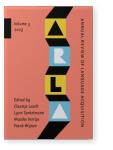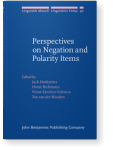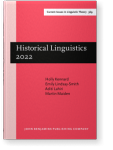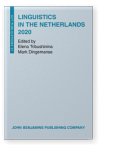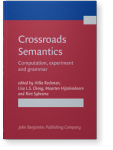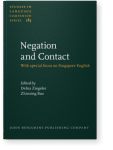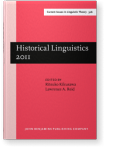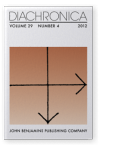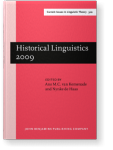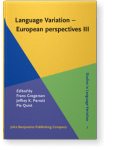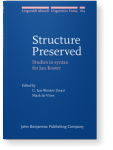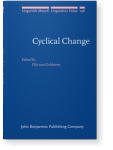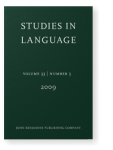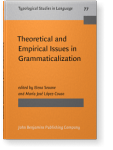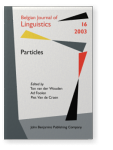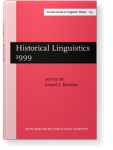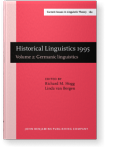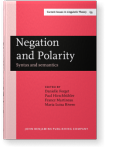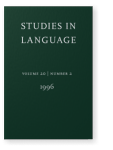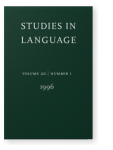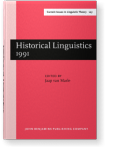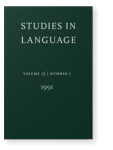Jack Hoeksema
List of John Benjamins publications for which Jack Hoeksema plays a role.
Yearbook
Title
Perspectives on Negation and Polarity Items
Edited by Jack Hoeksema, Hotze Rullmann, Víctor Sánchez-Valencia and Ton van der Wouden
[Linguistik Aktuell/Linguistics Today, 40] 2001. xii, 368 pp.
Subjects Generative linguistics | Semantics | Syntax
2025 日本言語政策学会 / Japan Association for Language Policy. 言語政策 / Language
Policy 10. 2014 Historical Linguistics 2022: Selected papers from the 25th International Conference on Historical Linguistics, Oxford, 1–5 August 2022, Kennard, Holly, Emily Lindsay-Smith, Aditi Lahiri and Martin Maiden (eds.), pp. 279–293 | Chapter
Policy 10. 2014 Historical Linguistics 2022: Selected papers from the 25th International Conference on Historical Linguistics, Oxford, 1–5 August 2022, Kennard, Holly, Emily Lindsay-Smith, Aditi Lahiri and Martin Maiden (eds.), pp. 279–293 | Chapter
Approximative adverbs such as almost, nearly, approximately and circa have received relatively little attention in historical linguistics. This paper documents how approximative expressions become more frequent as well as more lexically diverse in two European languages, to wit English and Dutch. read more
2020 On the Dutch temporal adverbial goed en wel Linguistics in the Netherlands 2020, Tribushinina, Elena and Mark Dingemanse (eds.), pp. 90–102 | Article
The paper investigates the origin, the development, the semantics and the pragmatics of the temporal use of the Dutch expression goed en wel ‘good and well’. We argue that the expression has developed from a meaning “safe and sound” into an indicator of the end of a preparatory phase or… read more
2017 Chapter 6. Polarity licensing and intervention by conjunction Crossroads Semantics: Computation, experiment and grammar, Reckman, Hilke, Lisa Lai-Shen Cheng, Maarten Hijzelendoorn and Rint Sybesma (eds.), pp. 93–106 | Chapter
Abstract
The licensing of polarity items by negation and other operators may be disrupted by an intervening conjunction. Conjunction intervenes when the polarity item is a conjunct or part of a conjunct, and negation or another licensor is outside the conjunction, having scope over… read more
2017 NEG-raising and long-distance licensing of negative polarity items Negation and Contact: With special focus on Singapore English, Ziegeler, Debra and Zhiming Bao (eds.), pp. 33–61 | Article
Collins and Postal (2014) have thrown new light on the relation between negation and complementation in contexts that either do or do not permit NEG-raising; in particular, that there are two types of polarity items differing in whether they require NEG-raising for long-distance licensing by… read more
2013 Immediate-future readings of universal quantifier constructions Historical Linguistics 2011: Selected papers from the 20th International Conference on Historical Linguistics, Osaka, 25-30 July 2011, Kikusawa, Ritsuko and Lawrence A. Reid (eds.), pp. 227–241 | Article
Sentences such as The train may arrive any minute (now) have a special non-universal interpretation. Similar types of sentences exist in Dutch, French, Spanish and elsewhere. I argue that they constitute a special construction, involving a universal quantifier, a temporal noun, optionally a… read more
2012 Diachronic changes in long-distance dependencies: The case of Dutch Historical Linguistics 2009: Selected papers from the 19th International Conference on Historical Linguistics, Nijmegen, 10-14 August 2009, Kemenade, Ans M.C. van and Nynke de Haas (eds.), pp. 155–170 | Article
Dutch long-distance dependencies representing four constructions (wh-questions, relative clauses, topicalization and comparatives) are studied from a diachronic corpus-based perspective. There is a steep decline in usage of such dependencies for relative clauses (but not free relatives) and… read more
2011 Variation in long-distance dependencies Language Variation - European Perspectives III: Selected papers from the 5th International Conference on Language Variation in Europe (ICLaVE 5), Copenhagen, June 2009, Gregersen, Frans, Jeffrey K. Parrott and Pia Quist (eds.), pp. 123–134 | Article
2010 Feature percolation in the Dutch possessive Structure Preserved: Studies in syntax for Jan Koster, Zwart, Jan-Wouter and Mark de Vries (eds.), pp. 167–174 | Article
2009 Chapter 2. Jespersen recycled Cyclical Change, Gelderen, Elly van (ed.), pp. 15–34 | Article
2009 The grammatical versatility of taboo terms Studies in Language 33:3, pp. 612–643 | Article
Taboo terms in certain English expressions and constructions are intensifiers, which have spread as a unit over time to various syntactic positions (Hoeksema & Napoli 2008). Here we look at the pragmatic coherence that has allowed such semantically disparate terms to be grammaticalized as a unit.… read more
2008 The emergence of particle clusters in Dutch: Grammaticalization under adverse conditions Theoretical and Empirical Issues in Grammaticalization, Seoane, Elena and María José López-Couso (eds.), pp. 131–149 | Article
2002 Polarity-sensitive scalar particles in early modern and present-day Dutch: Distributional differences and diachronic developments Particles, Wouden, Ton van der, Ad Foolen and Piet Van de Craen (eds.), pp. 53–64 | Article
2001 Rapid change among expletive polarity items Historical Linguistics 1999: Selected papers from the 14th International Conference on Historical Linguistics, Vancouver, 9–13 August 1999, Brinton, Laurel J. (ed.), pp. 175–186 | Article
2001 Scalarity and polarity: A study of scalar adverbs as polarity items Perspectives on Negation and Polarity Items, Hoeksema, Jack, Hotze Rullmann, Víctor Sánchez-Valencia and Ton van der Wouden (eds.), pp. 129–171 | Article
1998 On the (non)loss of polarity sensitivity: Dutch ooit Historical Linguistics 1995: Volume 2: Germanic linguistics, Hogg, Richard M. and Linda van Bergen (eds.), pp. 101–114 | Article
1997 Negation and Negative Concord in Middle Dutch Negation and Polarity: Syntax and semantics. Selected papers from the colloquium Negation: Syntax and Semantics. Ottawa, 11–13 May 1995, Forget, Danielle, Paul Hirschbühler, France Martineau and María Luisa Rivero (eds.), pp. 139–156 | Article
1996 Review of von Bergen & von Bergen (1993): Negative Polarität im Englischen Studies in Language 20:2, pp. 473–476 | Review
1996 Review of Progovac (1994): Negative and Positive Polarity: A Binding Approach Studies in Language 20:1, pp. 196–207 | Review
1993 Suppression of a word-order pattern in Westgermanic Historical Linguistics 1991: Papers from the 10th International Conference on Historical Linguistics, Amsterdam, August 12–16, 1991, Marle, Jaap van (ed.), pp. 153–174 | Article
